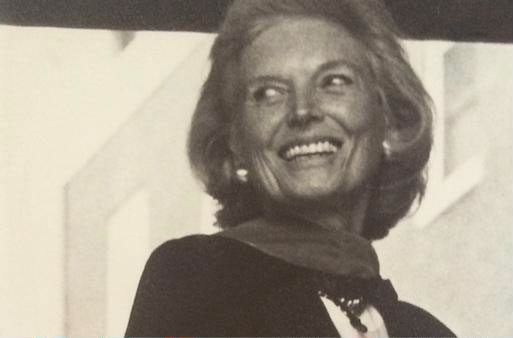Libby Anderson Cater Halaby
1925-2022
A Remembrance by Sherry Magill, PhD
In late spring 1983, I met Libby Cater.
Over the next almost 40 years, we shared a warm and loving friendship, filled with great conversation, frivolity, laughter and tears. I came to know her children, her loves, her friends, her zest for life, her expansive intellect, inquisitiveness, and unyielding optimism.
I was, when we met, an impoverished doctoral candidate. My friends and I drank beer and cheap wine. Libby taught me to enjoy vodka and martinis, capers and caviar.
She was my champion. I loved and admired her.
Twenty-seven years my senior, Libby and I were both graduates of the University of Alabama, knew many of the same people—she personally and me sometimes personally but more often from stories and history books—and shared a sense of place, determination, and beating the odds. You almost have to be from the Alabama we were from to understand. It's Faulkner's love-hate relationship with the Jim Crow Deep South.
We shared roots. Hers were deep, mine shallow. Her family had lived in Alabama for generations, while mine was transplanted. But we shared geography. As our friendship deepened and lengthened, we talked often about politics and race, topics native to white Alabamians of a certain time and place.
I had accepted a one-year job offer from Washington College president Douglass Cater. Libby's husband. He hired me to serve as executive director of an experimental seminar for small college professors. In desperate need of a job, no matter how temporary and grant-dependent, I arrived in June 1983 with no place to live and no local friends. Mr. Cater housed me first in the Alumni House attic, followed by a small house the college owned. Thank goodness, as it would take me three months to find a place of my own.
Clearly feeling sorry for me, or wanting to extend the work day, Mr. Cater routinely dragged me home to Hynson-Ringgold where Libby fixed supper and cocktails. We swam at the Havermeyer's farm on hot summer evenings, and boated around on the Chester River. Libby always welcomed me. And always took an interest in me, what I was reading and doing. She cared deeply about advancing the college, but she cared more about me and what I was up to.
When Mr. Cater decided to ask me to serve as his executive assistant, he had Libby make the offer. She invited me to have a drink alone with her. It felt odd. She popped the question; I hesitated. Cater was an exacting and demanding boss, and Libby knew it better than anyone. Having worked with him for almost a year, I told her I wasn't sure I was up to it. Libby leaned back, gave me a critical look, leaned in. She gave me a pep talk and let me know she would be standing by.
Washington College faced critical financial challenges, and experienced more than one financial reversal over the next seven years I worked in the president's office. The Caters—and I say The Caters because Libby was more than presidential wife; she was Doug's full partner and the College's loyal servant—set Washington College on a successful course, raising roughly $46 million when almost everyone said it couldn't be done. They transformed the physical landscape, created intellectual exchanges, and inspired a generation of students, administrators, and professors alike.
More importantly, The Caters taught Washington College to believe in itself, in its promise, its role in the life of the mind and public discourse.
With Libby, anything was possible.
Magill served Washington College from 1983-1991, as executive assistant to the president and later Vice President and Deputy to the President. She retired in 2018 after a 27-year career in private philanthropy, having served as President of the Jessie Ball duPont Fund headquartered in Jacksonville, Florida.
